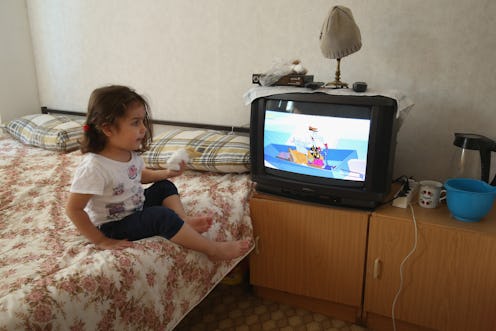Apparently, Plato would be very disappointed in us if he was around today, namely because we watch so much television and movies. In the Atlantic, author and philosopher Rebecca Goldstein says that Plato would be very alarmed at the dominance of film and television in our culture. Well, color me defensive. Is a reliance on film and television really all that terrible?
Of course, Goldstein is responding to the overarching notion that we're a country of couch potatoes, absorbing all entertainment and information through a screen in a dark room and shirking other forms of informational consumption. And to an extent, we do rely pretty heavily on a screen medium as our window to the world, but not all screen gems are created equal — and not all screen consumers are either.
Goldstein asserts that television and movies beg us to revisit Plato's cave allegory from The Republic, in which prisoners are placed in cave from birth and made to look upon images so that the images are essentially their reality. When they're freed and asked to reject the reality formed by images seen in the cave, they cannot and are crippled by confusion when confronted by this new reality.
He’d be very alarmed [about film and television's cultural dominance]. You can’t help but think immediately of his allegory of the cave in The Republic: The lowest form of consciousness is that of prisoners in the dark staring at images. He would be quite in despair. He would think that we were enchanted by the lowest form of thinking. To think is to be active; passivity is the death of the mind.
Yes, to a certain extent, if everyone who loves film and television is lumped into a box where The Big Bang Theory and Kevin Hart's Ride Along get equal weight with heady, complicated ventures like True Detective and most of the Oscar-nominated films this year, the majority of screen addicts are just as the prisoners in the cave: mistaking the rampant images on screen for reality. It's why we blame film and television for promoting sexism, unrealistic body image, and horrific violence, because when passive viewers remain in that cave, those things become reality. Much of the junky film and television that surrounds us does not demand thinking, and instead demands passivity in order to be enjoyable. So yes, if we take that narrow view of screen entertainment, it is rather alarming.
But TV and film is a diverse landscape these days. It also attracts a variety of audiences, from your average popcorn flick-loving set who just wants to turn off their brains and laugh, to the highly-engaged audience who wants to see a film or television show that challenges their mind to unravel a complicated plot or see life from an angle disparate from their own. There are series that call on us to deduce our own understanding of morality (like Breaking Bad and the aforementioned True Detective). There are films that are the perfect catalysts for debate and discussion (like 2013's Blackfish, which convinced me to renounce a beloved tradition from my childhood). There are even studies that suggest children who watch film with magical, fantastical content like Harry Potter movies actually grow up to be more creative thinkers. Not all of us are sitting in the cave, unwilling to leave and take a stroll in the real world in order to continue watching Real Housewives wear ballgowns to lunch and sitcom protagonists push each other into pools of mud.
There's a not-so-new group of TV lovers who embraces the medium as one with an almost literary capacity, something many folks have been doing with high brow film for years. So yes, if we're only counting Brooklyn Decker bounding in slow motion towards Adam Sandler or Juan Pablo throwing a pool party with 25 hot girls as the pieces that constitute film and television's dominance in our culture, then it's certainly appalling and absolutely the lowest form of cognitive thought. But if we recognize that, in many regards, well-made film and television with an intelligent, thoughtful core offers another channel of debate and discourse, isn't it possible that Plato wouldn't find it so alarming after all?
